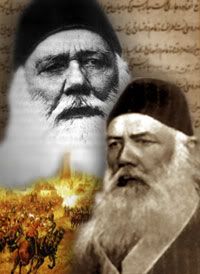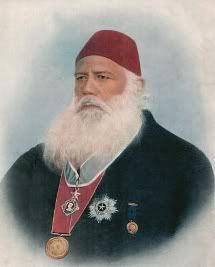Saad Qaisar
Today (October 17, 2008) marks the 191st birthday of Sir Syed Ahmed Khan (1817-1898).
 In the history of Indian Sub-Continent, the role Syed Sahib played for Muslims of India deserves golden words. Sir Syed was the most influential leader and social reformer of his time. He felt that the socio-economic future of Muslims was threatened by their orthodox aversions to modern science and technology. He made significant contributions in this regard that had long term implications for the Muslims of India that eventually lead to creation of state of Pakistan.
In the history of Indian Sub-Continent, the role Syed Sahib played for Muslims of India deserves golden words. Sir Syed was the most influential leader and social reformer of his time. He felt that the socio-economic future of Muslims was threatened by their orthodox aversions to modern science and technology. He made significant contributions in this regard that had long term implications for the Muslims of India that eventually lead to creation of state of Pakistan.
 Either it be his advocacy for Urdu to be recognized by British empire as second language of India & a symbol of Muslim heritage or establishment of a ‘Muslim Cambridge’ in form of MAO college at Aligarh, he is seen as a most vocal figure for the rights of Indian Muslims in the second half of 19th century under British Raj. At Aligarh, Sir Syed formed Scientific Society of Aligarh, the first scientific society of its kind in India that assembled Muslim scholars from across India, held annual conferences, disbursed funds for educational causes and regularly published a journal on scientific subjects in English & Urdu.
Either it be his advocacy for Urdu to be recognized by British empire as second language of India & a symbol of Muslim heritage or establishment of a ‘Muslim Cambridge’ in form of MAO college at Aligarh, he is seen as a most vocal figure for the rights of Indian Muslims in the second half of 19th century under British Raj. At Aligarh, Sir Syed formed Scientific Society of Aligarh, the first scientific society of its kind in India that assembled Muslim scholars from across India, held annual conferences, disbursed funds for educational causes and regularly published a journal on scientific subjects in English & Urdu.
His views, at times, challenged orthodox clergy who appeared averse to his message of ‘change’.
Today, as we find our nation amidst divergent schools of thought, when one segment of society is bent towards ultra-liberalism & appear to blindly follow western civilization, more of its bad than good and on other end, there are those who are hell bent to stick to age-old orthodox philosophy, do we await another Syed Sahib that would channelize our energies to the middle path. Or can we revive spirit of Syed Sahib’s life as a guideline in all the issues that confront us as a nation? Men like Syed Sahib are born once in decades, or perhaps, centuries! Are we ready to wait centuries for that to happen or reformulate our thought in-line with modern demands, choice is ours!
As Iqbal rightly put it:
aaen-e-nau say darna, tarz-e Kuhan pe aRna
manzil ye hi katthan hai, qaumoN kee zindagi meiN
‘To be afraid of modern ways, to get stuck on age old patterns, is the biggest hurdle in the life of Nations’.
Photo Credits: Khurram Ali Shafique and Wikipedia.com




















































Well written Saad Qaiser.
I agree with Ibrahim, about the
OMAR….
If he indeed laid the foundations of Pakistan then he was indeed a very far sighted man….the best thing to have happened, is Pakistan.
welll he was a gr8 man
i agree to uzma
we owe our education to him
coz he was the one who wanted muslims to get scietific education
so that muslims wont remain behind from others
Sir Syed Ahmad Khan was a great benefactor of the Muslims of South Asia. He was often compared by the orthodox clergy with Mutazalites who spearheaded the rationalist movement in Islam under the Abbasid rule.
While the rationalists produced great philosophers and scientists (Al-Farabi, Ibn Rushd, Ibn Khaldun, Ibn Sina, Al-Razi), they also were responsible for excesses against those who opposed the rationalist movement, including several ulema and Imams who favored faith over reason. All of this changed with the arrival of Imam Ghazali (who championed revelation over reason) when the tables were turned on the rationalists and Islamic civilization began its long term decline. No longer did the Muslims try and reconcile faith and reason. Islam choked in the grip of orthodoxy. No longer, as during the reign of the dynamic caliph al-Mamun and the great Haroon al-Rashid, would Muslim, Christian, and Jewish scholars gather and work together in the royal courts. It was the end of tolerance, intellect, and science in the Muslim world. The last great Muslim thinker, Abd-al Rahman ibn Khaldun, belonged to the fourteenth century.
More than anything else, Muslims need a Sir Syed Ahmad Khan for an Islamic Renaissance, to help revive sciences, the arts and the culture in the Islamic world to pull us out of the dark ages we are in now.